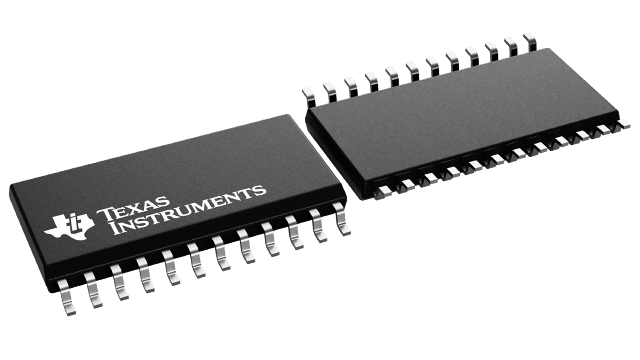
SN74HCT652DW
ActiveOCTAL BUS TRANSCEIVERS AND REGISTERS WITH 3-STATE OUTPUTS
Deep-Dive with AI
Search across all available documentation for this part.

SN74HCT652DW
ActiveOCTAL BUS TRANSCEIVERS AND REGISTERS WITH 3-STATE OUTPUTS
Deep-Dive with AI
Technical Specifications
Parameters and characteristics commom to parts in this series
| Specification | SN74HCT652DW | 74HCT652 Series |
|---|---|---|
| Current - Output High, Low [custom] | 6 mA | 6 mA |
| Current - Output High, Low [custom] | 6 mA | 6 mA |
| Mounting Type | Surface Mount | Surface Mount, Through Hole |
| Number of Bits per Element | 8 | 8 |
| Number of Elements [custom] | 1 | 1 |
| Operating Temperature [Max] | 85 °C | 85 - 125 °C |
| Operating Temperature [Min] | -40 °C | -55 - -40 °C |
| Output Type | 3-State | 3-State |
| Package / Case | 24-SOIC | 24-SOIC, 24-DIP |
| Package / Case | - | 0.3 - 7.62 mm |
| Package / Case [x] | 0.295 in | 0.295 in |
| Package / Case [y] | 7.5 mm | 7.5 mm |
| Supplier Device Package | 24-SOIC | 24-SOIC, 24-PDIP |
| Voltage - Supply [Max] | 5.5 V | 5.5 V |
| Voltage - Supply [Min] | 4.5 V | 4.5 V |
Pricing
Prices provided here are for design reference only. For realtime values and availability, please visit the distributors directly
| Distributor | Package | Quantity | $ | |
|---|---|---|---|---|
| Digikey | Tube | 1 | $ 2.88 | |
| 10 | $ 2.59 | |||
| 25 | $ 2.44 | |||
| 100 | $ 2.08 | |||
| Texas Instruments | TUBE | 1 | $ 2.17 | |
| 100 | $ 1.79 | |||
| 250 | $ 1.29 | |||
| 1000 | $ 0.97 | |||
74HCT652 Series
OCTAL BUS TRANSCEIVERS AND REGISTERS WITH 3-STATE OUTPUTS
| Part | Mounting Type | Voltage - Supply [Max] | Voltage - Supply [Min] | Operating Temperature [Max] | Operating Temperature [Min] | Package / Case [y] | Package / Case [x] | Package / Case | Current - Output High, Low [custom] | Current - Output High, Low [custom] | Output Type | Supplier Device Package | Number of Elements [custom] | Number of Bits per Element | Package / Case |
|---|---|---|---|---|---|---|---|---|---|---|---|---|---|---|---|
Texas Instruments SN74HCT652DWR | Surface Mount | 5.5 V | 4.5 V | 85 °C | -40 °C | 7.5 mm | 0.295 in | 24-SOIC | 6 mA | 6 mA | 3-State | 24-SOIC | 1 | 8 | |
Texas Instruments SN74HCT652NT | Through Hole | 5.5 V | 4.5 V | 85 °C | -40 °C | 24-DIP | 6 mA | 6 mA | 3-State | 24-PDIP | 1 | 8 | 0.3 in, 7.62 mm | ||
Texas Instruments CD74HCT652M | Surface Mount | 5.5 V | 4.5 V | 125 °C | -55 C | 7.5 mm | 0.295 in | 24-SOIC | 6 mA | 6 mA | 3-State | 24-SOIC | 1 | 8 | |
Texas Instruments CD74HCT652M96 | Surface Mount | 5.5 V | 4.5 V | 125 °C | -55 C | 7.5 mm | 0.295 in | 24-SOIC | 6 mA | 6 mA | 3-State | 24-SOIC | 1 | 8 | |
Texas Instruments SN74HCT652DW | Surface Mount | 5.5 V | 4.5 V | 85 °C | -40 °C | 7.5 mm | 0.295 in | 24-SOIC | 6 mA | 6 mA | 3-State | 24-SOIC | 1 | 8 |
Description
General part information
74HCT652 Series
The ’HCT652 devices consist of bus-transceiver circuits, D-type flip-flops, and control circuitry arranged for multiplexed transmission of data directly from the data bus or from the internal storage registers. Output-enable (OEAB and OEBA\) inputs are provided to control the transceiver functions. Select-control (SAB and SBA) inputs are provided to select real-time or stored data transfer. A low input level selects real-time data; a high input level selects stored data. Figure 1 illustrates the four fundamental bus-management functions that can be performed with these devices.
Data on the A or B data bus, or both, can be stored in the internal D-type flip-flops by low-to-high transitions at the appropriate clock (CLKAB or CLKBA) terminals, regardless of the select- or output-control terminals. When SAB and SBA are in the real-time transfer mode, it is possible to store data without using the internal D-type flip-flops by simultaneously enabling OEAB and OEBA\. In this configuration, each output reinforces its input. When all other data sources to the two sets of bus lines are at high impedance, each set of bus lines remains at its last state.
To ensure the high-impedance state during power up or power down, OEBA\ should be tied to VCCthrough a pullup resistor and OEAB should be tied to GND through a pulldown resistor; the minimum value of the resistor is determined by the current-sinking/current-sourcing capability of the driver.
Documents
Technical documentation and resources


